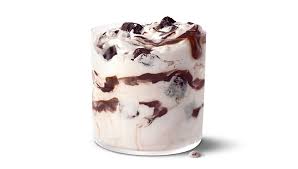Ice Cream McDonalds Nutrition: Get The Details!
Are You Curious To Know About Ice Cream McDonalds Nutrition? When indulging in a sweet treat, few desserts are as universally loved as ice cream, and McDonald’s offers a classic version that many enjoy. But how does this beloved dessert stack up in terms of nutrition? Understanding the Ice Cream McDonald’s Nutrition can help you make informed choices, whether treating yourself or keeping an eye on your dietary intake. Each serving contains various nutrients, including calories, fats, sugars, and vitamins and minerals.
With ingredients like milk, sugar, and cream, it’s essential to consider how this tasty treat fits into your overall diet, especially if you have dietary restrictions or health goals. In this post, we’ll delve into the specifics of McDonald’s ice cream, exploring its nutritional profile, ingredients, and even how long it would take to burn off those calories. Whether you’re a fan of this creamy delight or just curious about what’s inside, you’ll find valuable insights to enhance your understanding of this popular dessert.
Table of Contents
Serving Size and Calories

Understanding the serving size is crucial when looking at McDonalds Ice Cream Calories. A single serving size is 1 cup, weighing 132 grams. Each serving packs 273 calories, which contributes significantly to your daily intake. This portion size makes it easier to gauge how much you’re consuming.
Transitioning to the calorie content, these 273 calories come from a mix of fats, carbohydrates, and proteins. With 15 grams of total fat and 31 grams of total carbohydrates, it’s clear that this treat is calorie-dense. Such information helps in making informed dietary decisions. Being aware of these numbers can aid in managing your overall calorie consumption. Remember this the next time you indulge in McDonald’s ice cream.
Breakdown of Fat Content
| Nutrient | Amount per Serving | Daily Value % |
| Total Fat | 15 grams | – |
| Saturated Fat | 9 grams | 45% |
| Polyunsaturated Fat | 0.6 grams | – |
| Monounsaturated Fat | 3.9 grams | – |
Cholesterol and Sodium Levels
| Nutritional Component | Amount per Serving | Percentage of Daily Value |
| Cholesterol | 58 mg | 19% |
| Sodium | 106 mg | 5% |
Carbohydrates and Sugars

| Nutritional Aspect | Details |
| Total Carbohydrates (per serving) | 31 grams |
| Sugar Content | 28 grams (high sugar content) |
| Source of Sugars | Natural sugars from milk and added sugars |
| Importance of Carbohydrates | Essential for energy |
| Health Consideration | High sugar can impact overall health |
| Recommendation | Be mindful of daily carbohydrate limits |
| Balance Advice | Enjoy in moderation to maintain a healthy diet |
Protein and Micronutrients
| Nutrient | Amount per Serving | % Daily Value | Function |
| Protein | 4.6 grams | – | Supports muscle repair and growth |
| Vitamin D | 0.3 micrograms | 1% | Crucial for bone health |
| Calcium | 169 milligrams | 13% | Vital for strong bones and teeth |
| Potassium | 262.7 milligrams | 6% | Aids in muscle function and electrolyte balance |
Ingredients List
| Ingredient | Function |
| Milk | Forms the base, creating a rich, creamy texture. |
| Sugar | Sweetens the ice cream. |
| Cream | Adds to the creamy texture. |
| Corn Syrup | Sweetener, enhancing the overall sweetness. |
| Natural Flavors | Enhances taste without artificial additives. |
| Mono and Diglycerides | Emulsifiers that improve texture and consistency. |
| Cellulose Gum | Stabilizer that maintains smoothness. |
| Guar Gum | Stabilizer that maintains smoothness. |
| Carrageenan | Stabilizer that maintains smoothness. |
| Vitamin A Palmitate | Fortifies the ice cream. |
Allergens and Dietary Concerns

| Aspect | Details |
| Primary Allergen | Milk |
| Unsuitable For | Individuals with dairy allergies or lactose intolerance |
| Potential Reactions | Dairy products can trigger severe reactions in some individuals |
| Other Possible Allergens | Traces of nuts and gluten due to shared equipment |
| Cross-Contamination | Generally minimized but still possible; caution is advised for those with severe allergies |
| Stabilizers Used | Cellulose gum, guar gum, and carrageenan |
| Safety of Stabilizers | Typically safe but may cause digestive issues in sensitive individuals |
| Importance of Awareness | Helps individuals make informed dietary choices when indulging in ice cream |
Caloric Burn Off
When considering Ice Cream from McDonald’s Nutrition, knowing how to burn off those calories is helpful. For instance, walking at three mph for 74 minutes will do the trick. If you’re more inclined to run, 26 minutes at six mph should suffice. Bicycling at ten mph takes about 38 minutes to burn off the same amount.
These activities provide various ways to balance your calorie intake. You have options, whether you prefer a leisurely walk or an intense run. It’s essential to match your physical activity with your dietary choices. Keep this in mind when enjoying McDonald’s ice cream. Your fitness goals can be managed effectively with the right balance of exercise and treats.
Making Informed Choices

Making informed choices about your diet involves understanding nutritional information and ingredient lists. When enjoying McDonald’s ice cream, moderation is key. Balancing your intake with physical activity helps manage calorie consumption. For instance, opt for smaller servings or share a portion. Keep track of your daily fat, sugar, and calorie limits to maintain a balanced diet.
Transitioning to ingredients, be aware of potential allergens and choose accordingly. Being mindful of added sugars and fats can also guide healthier decisions. Additionally, incorporating other nutrient-dense foods throughout your day ensures a well-rounded diet. Treats like ice cream can fit into a healthy lifestyle when consumed in moderation and with awareness. Making smart dietary choices enhances your overall well-being while allowing occasional indulgences.
Frequently Asked Questions
Is McDonald’s ice cream suitable for people with lactose intolerance?
McDonald’s ice cream contains milk, making it unsuitable for lactose-intolerant people. It may cause digestive discomfort for individuals sensitive to lactose.
How many calories are in a serving of McDonald’s ice cream?
A single serving of McDonald’s ice cream contains 273 calories. This can contribute significantly to your daily calorie intake.
What types of fats are in McDonald’s ice cream?
McDonald’s ice cream includes saturated, polyunsaturated, and monounsaturated fats. Saturated fats comprise a significant portion, contributing to 45% of the daily value.
Can McDonald’s ice cream contain traces of nuts or gluten?
Due to shared equipment, McDonald’s ice cream may contain traces of other allergens, such as nuts or gluten. Cross-contamination is minimized but still possible.
Conclusion
Indulging in McDonald’s ice cream can be a delightful experience. However, understanding its nutritional profile helps you make better choices. With 273 calories per serving, balancing this treat within your daily intake is crucial. Notably, it contains various fats, sugars, and essential micronutrients. Transitioning to ingredients and knowing what’s in your ice cream allows you to be mindful of allergens.
Physical activities like walking or biking can help burn off calories. By paying attention to portion sizes and balancing your diet, you can enjoy this creamy delight responsibly. Ultimately, making informed decisions ensures you can indulge occasionally while maintaining a healthy lifestyle. Remember, moderation is vital, and being aware of your dietary intake enhances your overall well-being.





